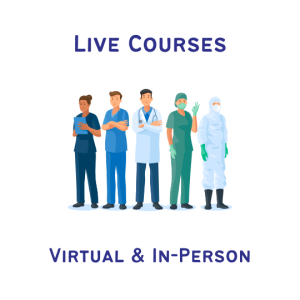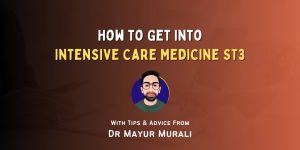
Published May 4, 2023 | Updated August 17, 2023
By Kuvira Manamperi
Hey there! I’m Kuvira, a junior doctor trying to navigate my way through NHS. I’m excited to share my insights and experiences with you!
The transition from medical student to FY1 can be a daunting and challenging experience. It’s a time when you leave the comfort of your university and enter the world of clinical practice where you are directly responsible for patient care.
For me, the experience was particularly challenging as I had moved to a new country to start my first job as an IMG. Initially, I was optimistic and excited to start this new chapter in my life, but it didn’t take long before I felt like I was drowning.
Coming from a background of academic and extracurricular success, I put a lot of pressure on myself to excel at my job, make new friends, maintain my hobbies, and stay physically fit. I thought that since I had settled in quickly during my university years, I would do the same in my new job. But the reality was different. I slowly realised that this was an unrealistic expectation.
It took me six months to finally break through the surface of the water and feel like I was settling into my new life.
Navigating the Tides of Work
Starting as an FY1 doctor in a clinical setting is a daunting experience. Gone are the days of textbooks and actors; this is the real deal. You are now dealing with real patients, many of whom are critically ill and require urgent medical attention. It can be overwhelming to navigate this new environment, especially when you are also trying to learn the ropes of a new hospital and the admin-related tasks that come with it.
I found that one of the biggest challenges was working with difficult colleagues. It’s not uncommon to come across colleagues who may be unhelpful or even hostile, which can be particularly demoralising for a new doctor.
Moreover, it was a tough adjustment to realise that I had to emotionally separate myself from my patients to some degree in order to provide the best care possible. Initially, it felt wrong and even selfish to not fully empathise or sympathise with my patients, but as I gained more experience, I realised that this was necessary to maintain a professional distance and to prevent burnout.
It was a difficult balance to strike, but I knew that by keeping some emotional distance, I could provide better care for my patients and ensure that I could cope with the emotional demands of the job.
Flying Solo (Or Sinking?)
Living alone was a new experience for me, one that I had never encountered before. Throughout my life, I was constantly surrounded by family or friends, so the sudden shift of living in a new city with no one I knew was jarring. The silence of my apartment was deafening and felt like a constant reminder of my solitude. The feeling of loneliness crept in, and it felt as though I was living in a void. The isolation was suffocating and made me question if I had made the right decision to move away.
However, I slowly began to realise that building a new support system would take time and effort. I started to reach out to colleagues and other medical professionals in the area, attending social events, and making small talk with new people. It was difficult at first, but over time, I found that the connections I made with others helped to alleviate the feelings of isolation.
I did find some silver linings. One of them was meeting my now-partner, who understood the struggles I was facing in my new job and living alone. Having him in my life was a much-needed source of comfort and support during those early days, and he helped me feel less lonely and anxious.
Building Bridges
During my time at university, I lived with my best friend for all five years, and we did everything together from studying to going out and having fun. She was my go-to person, and I felt like I could rely on her for anything. So, when I moved to a new city, I put a lot of pressure on myself to find a similar friend, someone I could connect with on that level.
I worried about making friends, socialising, and finding a balance between work and personal life. It was challenging at first, and I often felt isolated and lonely. But over time, things got better. I started to meet new people and build a social circle, and I found that there were many other young doctors in the same position as me.
Speaking to my colleagues, I realised that I wasn’t alone and that we were all in this together. This moment was a turning point for me. I realised that it was okay to ask for help and that my colleagues were there to support me. Eventually, I found a group of friends that I could rely on for everything, from advice to a good night out.
Having a strong support system has made a huge difference in my life, making me feel less isolated, and more like a part of the community. We were all on the Titanic and we helped each other stay afloat (unlike selfish Rose, they was definitely enough space on that plank for Jack).
Diving into Financial Independence
Living independently also meant learning to be financially responsible. Before starting my job as an FY1, I had relied on my parents for money and would spend without giving it a second thought. However, being financially independent made me realise the importance of counting pennies and budgeting.
As someone who had never really faced financial struggles before, I found myself stressed and anxious about money. I had to do many extra on-call shifts to try to keep up with my old lifestyle, but this came at a cost. The long hours took a toll on my physical health, and I found myself constantly exhausted and drained. However, these struggles taught me valuable lessons about humility and the importance of being financially responsible.
I couldn’t rely on “retail therapy” as much as I used to before, and I learned to prioritise my spending on necessities. It was a difficult adjustment, but one that has made me more resilient and adaptable.

Just Keep Swimming
As an FY1, it’s important to remember that it’s okay to feel overwhelmed and that you’re not alone. Seeking help from colleagues and mentors can make a huge difference. It’s also important to take breaks and engage in activities that bring you joy and relaxation. This will help you to maintain your physical and mental well-being, which is essential for your performance as a doctor.
Looking back on my journey, I am grateful for the challenges I faced. They taught me resilience, perseverance, and the importance of seeking help. They also helped me to become a better doctor.
To any incoming FY1s, I would say: take it one day at a time, be kind to yourself, and never be afraid to ask for help. Remember that you’re not alone and that your colleagues and mentors are there to support you. Most importantly, don’t forget to give yourself a break and enjoy the journey, because that’s what it is; a journey that will teach you valuable lessons and shape you into the doctor you will become.
If you’re struggling with your mental well-being, there is plenty of help out there – here are some free resources for doctors.














